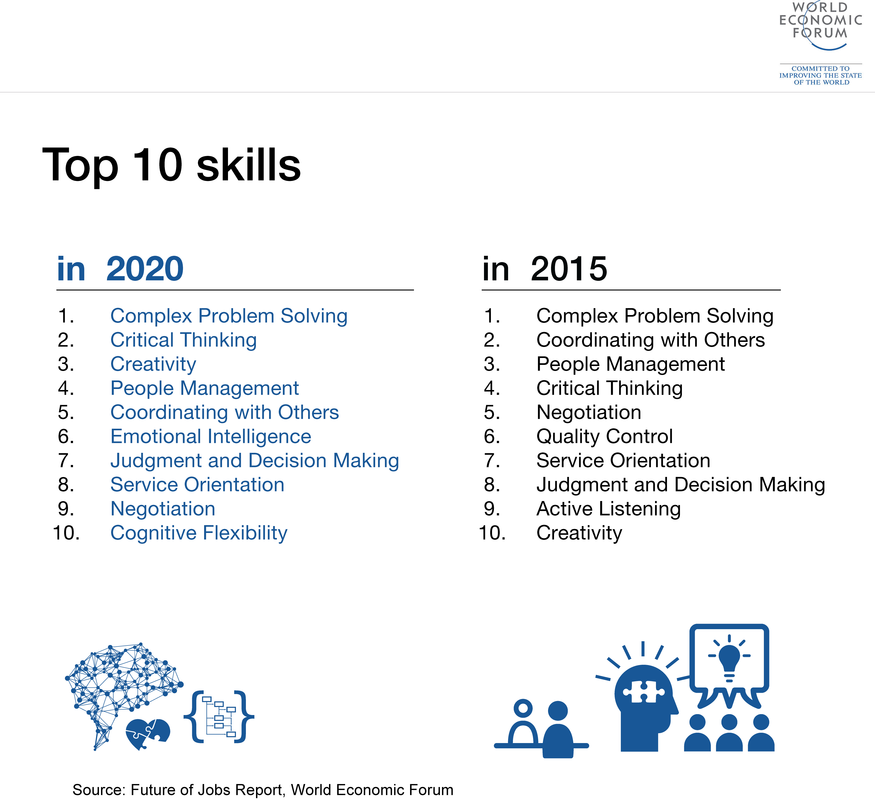 The Coaching Group of Switzerland will support with acquiring these skills - Contact Us The Coaching Group of Switzerland will support with acquiring these skills - Contact Us What Is Emotional Intelligence?In the list above, one can see which work skills were important in 2015 and what's changed for 2020. One notable change is that Emotional Intelligence is #6 on the skills list for 2020 and was not even on the list in 2015! Why is Emotional Intelligence now on the list? Simple. Emotional Intelligence affects almost everything we do. It applies both to the understanding of ourselves and how we understand others.It's crucial to both People Management and Coordinating with Others (#4 and #5 on the 2020 list). If you have Emotional Intelligence, you are attuned to your own feelings and can empathize with others on the basis of this. Understanding your own feelings enables you to recognize and interpret emotions in others, seeing how these emotions enter into your behaviour and attitudes. Emotional Intelligence also means that you can act on your perceptions in a productive manner. Change management has become increasingly important for companies. For successful and sustained changes, coaching and training are essential and understanding Emotional Intelligence is a big part of it as change management is based on the emotional intelligence skills (soft skills) of the whole workforce. The soft skills that make up Emotional Intelligence can be developed through learning the appropriate life skills and applying them at work. How Increasing Your Emotional Intelligence Makes You More Effective at WorkThe level of Emotional Intelligence (also called EQ) can be the difference between a merely good business-person and a successful one. What we mean by “successful” in this case is one who is confident, strong, emphatic, effective, productive, inspiring, and efficient at managing time and stress levels. Such a person will feel and be truly comfortable at work.
Today the concept of EQ is having a strong impact on the business and corporate world. It is now accepted that a well-developed EQ allows a manager or team member to restrain less productive feelings and focus on his or her goals with more positive feelings. Such a person will be a self-confident, open communicator who inspires other people. Anger, self-doubt and stress will not be in evidence. Emotional Intelligence is defined as having the ability to recognize and understand emotions and their impact on behaviour and attitudes, especially in others. Those who have a high degree of Emotional Intelligence are able to understand their own feelings and thus tune into how others are feeling. The result is that they can act on their perceptions in a truly productive manner. Having Emotional Intelligence includes possessing a level of awareness in the areas of: self-management, self-esteem, motivational skills, empathy, interaction skills, self-confidence, relationship management, stress management, time management, and emotional self-awareness. Your EQ affects almost everything you do. For example, if you work in a solitary setting, the quality of your work is determined by your self-esteem and self-confidence. Both help to keep you motivated and inspired. Studies have show that CEO’s make many of their decisions intuitively, mainly because in this fast-moving world there is not enough time to wait for all the facts. Thus a leader’s best thinking and decision-making is grounded as much in their EQ as their IQ. There is significant evidence that the skills a person with a high EQ brings to bear have a significant impact on organizational performance. The good news is that whilst the IQ is relatively fixed, Emotional Intelligence (EQ) can be developed. For this reason, more and more companies are hiring life coaches to improve the standard of their management by increasing the EQ of their leaders and first-time managers. An organization that fails to recognize the need for Emotional Intelligence in its culture does so at its own peril. by Suzie Doscher (excerpt from 'Balance - A Practical Handbook for Life's Difficult Moments')
0 Comments
Your comment will be posted after it is approved.
Leave a Reply. |
 RSS Feed
RSS Feed